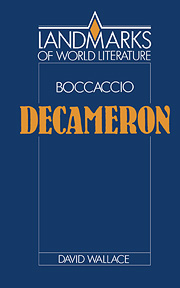3 - After the Decameron
Published online by Cambridge University Press: 05 June 2012
Summary
In the last twenty years of his life Boccaccio expressed his increasing dedication to Petrarch and the emergent humanist movement by turning from vernacular composition to Latin encyclopaedism. He wrote just one more text of Italian fiction, the Corbaccio (‘Evil Crow’), and this may itself be considered as a kind of dramatized anti-feminist encyclopaedia: every misogynistic line on women from antiquity and the Church Fathers to the present finds a place in it. This strange dream narrative, in which an anonymous male narrator learns the terrible truth about women from a ghost, the husband of the widow he is currently infatuated with, may be read as a continuation or revamping of Decameron VIII, 7. Boccaccio evidently remained caught between his aspiration for clericalhumanist celibacy and solitariness and his need for female company. He had himself legitimized by papal dispensation in 1360, took minor clerical orders and probably ended his life as a priest. And yet in his Latin vision poem Olympia, a remarkably joyful and optimistic work that bears comparison with the Middle English Pearl, he meets with five (at least five) of his own illegitimate children who have died in infancy. He was seriously unnerved in 1362 by a message from a Carthusian monk, Pietro Petroni, telling him that he would be damned for eternity if he did not renounce his literary work. And yet in 1370 he set about revising his Decameron, producing the autograph manuscript that survives as MS Hamilton 90 in the Berlin Staatsbibliothek.
- Type
- Chapter
- Information
- Boccaccio: Decameron , pp. 108 - 113Publisher: Cambridge University PressPrint publication year: 1991

